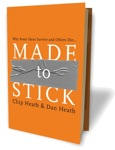 What makes magic routines, or indeed any idea, memorable? There have been numerous works focusing on memorable ideas, both generally, such as Malcom Gladwell's Tipping Point, and in magic, such as Michael Ammar's Making Magic Memorable, but these focus more on sample memorable ideas. What I was curious about was the principles behind these ideas.
What makes magic routines, or indeed any idea, memorable? There have been numerous works focusing on memorable ideas, both generally, such as Malcom Gladwell's Tipping Point, and in magic, such as Michael Ammar's Making Magic Memorable, but these focus more on sample memorable ideas. What I was curious about was the principles behind these ideas.
So were Chip and Dan Heath, the authors of the book Made To Stick. They examined what made any idea, real or imagined, stick in the human memory. What they found were six basic principles, which are detailed in the book. The best part is that the principles aren't just discussed abstractly, but so concretely that you actually understand how to apply them!
Made To Stick is a book that has been needed in so many fields, including magic performances for so long, I've decided to devote each of 6 posts, starting with this one, to one of the principles described in this book.
The most basic of the 6 principles is simplicity. Simplicity cuts through confusion, and directs focus. If you've ever been paralyzed by a decision, you were more than likely making things too complicated, or the basic ideas weren't clear enough.
How do you employ simplicity? Chip and Dan Heath describe the two major ingredients of simplicity. The first step is to find the core idea. Take a look at the first sentence of any story at Google News. You get the general idea of the story right there, thanks to the idea of the inverted pyramid. Find your core idea, and don't hide it; make sure that the idea is at the forefront.
The second part of simplicity is to take the core idea and make it compact. How do you make it compact? There are 3 basic ways: 1) Use existing ideas as a starting point, 2) create a "high concept pitch" to describe the idea, and 3) use analogies that act as a platform for new ways of thinking. An example of such "generative analogies" from the book is the Disney Store's use of a theatrical metaphor (customers are guests, uniforms are costumes, etc.).
In magic, as with any other type of idea, simplicity can be applied at numerous levels. David Blaine understood this when creating his performing persona. His core idea was that of a performer who didn't talk about himself much. David Blaine decided he was someone who seemed to come out of nowhere, work with simple items and whatever was in his environment, and then move on. He made this idea compact by referring to his persona as the "Mysterious Stranger" (which also became the title of his first book).
Note that he's so effective at creating this character that to picture him performing with large boxes on a Vegas stage is an almost comical image!
Simplicity can also be effective as an aid in presentation. David Copperfield spent years developing his persona as the romantic, man-about-town. On his 15th special, he opened up with a routine called Heaven on the Seventh Floor, which is memorable largely due to its simplicity. It takes advantage of a core idea, the persona Copperfield has worked hard to create, and presents that core in a compact manner. As proof, check out the first comment at IMDB's entry for that same TV special. Even though the special aired in 1992, and the comment wasn't written until 13 years later, the first trick they remembered was this one!
That's the power of simplicity. It acts as an icon, giving not only a general idea, but also quickly expressing what is part of a concept and what is not. For more on the power of simple ideas, check out the simplicity category of the Made To Stick blog.




1 Response to Memorable Magic: Simplicity
The 'Inverted Pyramid' concept is quite interesting.
As a Magical Entertainer,I can envision how I may be able to employ this concept to help my guests understand right up front where we will going with any given effect.
This should enable me to say less during the routine...which may in turn allow the audience to really focus on the 'magic' as it occurs.Nice!
Rich
Post a Comment